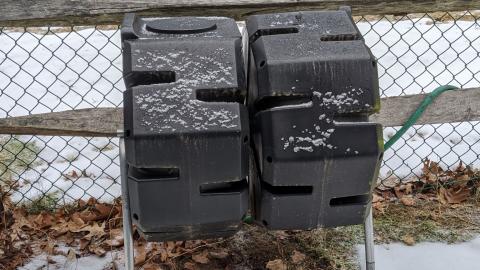Can you compost in the winter?

If you’re new to composting, you may be wondering if it is okay, or even possible, to compost through the winter months. Most likely your stream of compostable kitchen waste won’t diminish because of freezing temperatures and snow on the ground. Fortunately, it is absolutely possible to continue successfully composting during the winter. You can even start composting for the first time in the winter. While the decomposition process slows down once the temperature drops, it doesn’t totally stop, or at least not for long. Bacteria, fungi and other microbes, as well as larger decomposers like sowbugs, pillbugs and earthworms, can survive in compost piles year-round and will start breaking down organic matter as soon as it gets a little warmer.
The only time decomposition comes to a stop is when the materials in a compost pile are completely frozen. However, if you have a large compost pile or bin, it’s likely that the organic matter in the interior will stay warm enough to avoid freezing, and decomposition will occur even in winter. You’ll have the most success composting in the winter if you use some of the following suggestions.
Gather Leaves
One of the most important things you can do in the fall is gather leaves for use in composting. Leaves and pine needles are excellent brown, carbon-rich materials that improve compost pile aeration and reduce odors. Leaves can be stockpiled in bags or bins for use throughout the year. If leaves are to be stored in an open bin, you might find it helpful to cover them with a tarp in order to keep them from getting wet and matting together. If you don’t have access to lots of leaves, fall is a good time to stockpile other brown materials such as straw, sawdust, woodchips or shredded newspaper.
Harvest Finished Compost
Harvest finished compost to make room for winter additions. Compost can pile up quickly in the winter months because decomposition is very slow. Harvesting finished compost is especially important if you are working with small bins or tumblers. You’ll know your compost is ready to use if the original organic materials are no longer recognizable and if the compost is dark and crumbly with an earthy odor. Compost can either be spread in the garden in the fall or saved for use in the spring. You may find it helpful to keep finished compost in lidded bins or cover it with a tarp so that it doesn’t get too soggy.
Layer Greens with Browns
Just like in the summer, the composting process will be most efficient if you continue to layer greens with browns in the winter. A common mistake is to add only greens throughout the winter months, which can create a stinky, wet mess come spring thaw. If you aren’t able to add brown materials in the winter, it’s okay to turn the pile in the spring and mix in more browns then to improve drainage.
Reduce the Size of Greens and Browns
Reducing the size of green and brown materials by cutting, chopping or shredding them into smaller pieces can markedly speed up the decomposition process by increasing surface area, giving decomposers more surfaces on which to feed.
Insulate the Pile
Insulate compost in order to keep it from freezing solid and halting decomposition. Compost bins can be surrounded with bags of leaves or straw bales to buffer against freezing temperatures. Another option is to ring the inside of the bin with 6-12 inches of leaves, sawdust or woodchips.
Wait to Turn the Pile
There is no need to turn the compost pile in the winter months, as doing so will only result in heat loss in the interior of the pile. This can slow the decomposition process further. Instead, wait to turn the pile in the spring once it is completely thawed.
Skip the Wood Ashes
While it may be tempting to dispose of wood ashes in the compost pile, this can actually cause more harm than good. Large amounts of wood ash can quickly raise the pH of the compost pile, moving it above the optimum range and decreasing microbial activity. Most of the beneficial organisms in compost piles do best when the pH is neutral to slightly acidic.
Related Resource(s)
Do you love learning about stuff like this?
SUBSCRIBE TO Granite State Gardening newsletter
Got questions? The UNH Extension Yard and Garden Infoline offers practical help finding answers for your yard and garden questions.
Call toll free at 1-877-398-4769, Monday to Friday, 9 a.m. to 2 p.m., or fill out webform.
